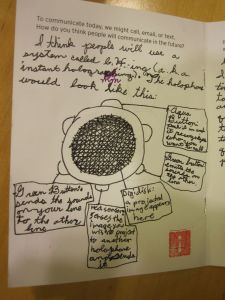June 2, 2011 — by Gretchen Caserotti at Libraries and Transliteracy

 Read a book set in the future (read)
Read a book set in the future (read)- What is the coolest invention of your lifetime so far and why? (write)
- Draw a futuristic car and name it (draw)*
- Draw a map of your bedroom. Be sure to include a key (draw – spatial)
- Take a picture of yourself holding your favorite book this summer and email it to the Children’s Library (digital)
- Watch a movie about a different time period (visual)
- Use Google Translate to translate the first line of the book you’re reading into another language (digital)

*in case you’re interested, the cars of the future will have ice cream machines in them, if kids have anything to say about it.
And so on. Some quests could be done many different ways like Find out when the town of Darien was founded. Some kids read it on the town marker sign, some went to Town Hall, some looked it up on Wikipedia, some IM’d a Librarian – all kinds of different ways to answer! When kids had completed Quests, we stamped their passports and entered them into raffle drawings. The kids wrote and drew in their passports all summer long and the more Quests they completed, the more chances they had to win in raffle drawings for prizes. Instead of spending a ton of money on cheap prizes, we spent our money on prizes they would be willing to compete for – iPod Shuffles, Flip video cameras and this year, an iPad! Everyone got a free book prize just for singing up and we had other ways to win prizes throughout the summer.
The program as we run it now has been a HUGE success. The parents have raved about how their kids are eager to participate, the family can participate together or the kids can go alone. Each family is different. It also levels the playing field. A 3rd grader can zip through series books lickety-split while a 5th grader may take all summer to get through a dense chapter book. With the passport, kids can imagine and create at whatever level is right for them.
We also ask the kids to write reviews and tag items in our catalog (SOPAC). We’ve gotten our school librarians to help us spread the word and all the kids have been shown how to do this simple activity. We’ve shown them how they can use tags to create custom reading lists and ask them to write reviews in the catalog in order to receive an invitation to our finale event where they get to meet a popular author and get an autographed copy of his/her book.
For kids who couldn’t come into the library to check in, they could enter their quests online through a simple form we created using WuFoo to be entered into raffle drawings. I think our web portion of the program has much room for improvement, but sometimes you just have to make do with what you’ve got!
You know who has a GREAT summer reading website that also incorporates the ideas we talk about here? The NYC Summer Reading website. They have the traditional elements of summer reading available digitally, but also include elements of social media and gaming through the use of avatars, the ability to “Like” another child’s review and win badges. I see this activity as embracing a few literacies beyond simple traditional print literacy and have been impressed with it’s first year out and will watch to see how it evolves.

Summer Reading Programs are a great way to experiment with Transliteracy. What does your program look like? Would kids want to participate or do they only do it because their moms make them?
Filed under: 21st Century Literacies, Best Practices, literacy, Multimedia Literacy, Transliteracy in Practice
No comments:
Post a Comment